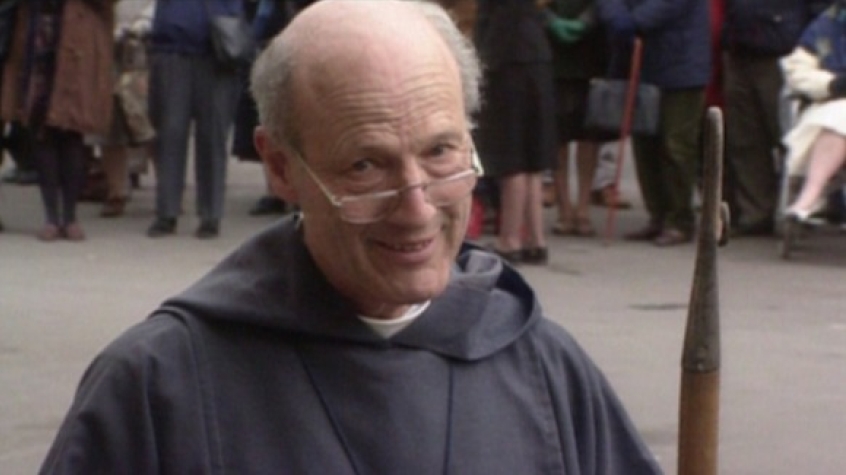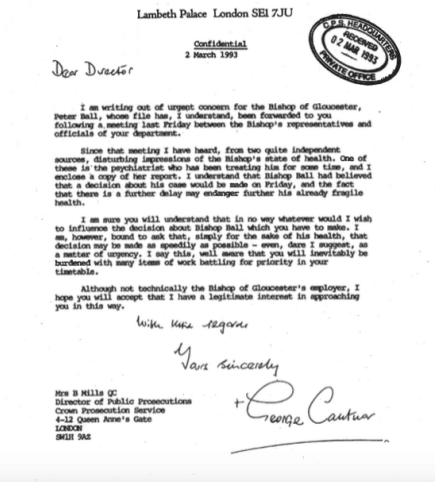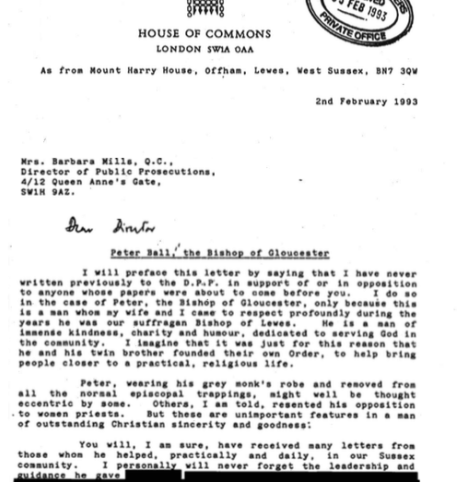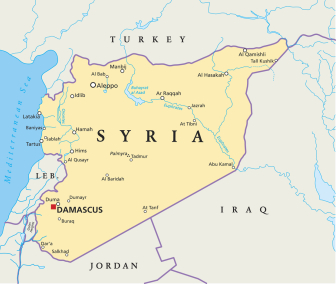Senior establishment figures wrote letters to the Crown Prosecution Service and leading police officers in support of disgraced Church of England bishop Peter Ball. They included the former Lord Justice Anthony Lloyd, the late Tory Tim Rathbone who was Prime Minister David Cameron's godfather and the former Tory Cabinet Minister Tim Renton. Ball, 83, is currently in prison after being sentenced last October for a string of offencs against 18 teenagers and young men between 1977 and 1992. Lord Justice Lloyd wrote to the Chief Constable of the Gloucestershire force, which was investigating Ball, and said: "He is the most gentle upright and saintly man I have ever met."

The 12 letters were released after The Telegraph and BBC submitted Freedom of Information requests. The law which allows the requests is currently being reviewed due to cost.
Among those who wrote letters to Barbara Mills, Director of Public Prosecutions, was former Archbishop of Canterbury Lord Carey of Clifton. He was clear that he did not wish to influence the decision to prosecute, but he wrote two letters. In the first, in February 1993, he said his first reaction to allegations of indencent behaviour with an adolescent was that it was "improbable" and that the allegations had caused Ball "excruciating pain and spiritual torment". In the second, a month later, he expressed concern about Ball's "fragile health".
Tim Rathbone wrote to Gloucester Police that it was "literally inconceivable" that Ball would ever become involved with anyone in in the way "insinuated" by "the newspapers".
Another former Archbishop, Donald Coggan, who died in 2000 and who ordained Ball in 1977, wrote: "I have seen a good deal of excellent qualities in his work. I have known him as a godly man, totally devoted to his church. He has had an unblemished record."
Ball was merely cautioned after he admitted one count of gross indecency. He resigned as Bishop of Gloucester in 1993 but was later allowed to resume his ministry and was given a licence to officiate in Bath and Wells diocese until 2010.
He was finally jailed for 32 months last October, 22 years later, after he admitted a string of offences against 18 teenagers and young men between 1977 and 1992. During his trail that the court at Old Bailey was told the original decision not to prosecute had been made after police received dozens of letters and calls.
The allegations were first made in 1992 by Neil Todd, one of the victims, at the bishop's house in East Sussex where he had set up his own monastic community for young men. Todd committed suicide in 2012, shortly after the police re-opened their investigation and Ball was arrested.
Phil Johnson, indecently assaulted by Ball when he was a 13-year-old choirboy, told the Mail: "This campaign is indicative of how the Establishment has looked out for its own."
Rev Graham Sawyer, vicar of Briercliffe, Burnley, who was abused by Ball in the 1980s, told The Telegraph: "It is terribly sad he was not prosecuted in 1993 and it has not served anyone well. There needs to be a full investigation. Unfortunately the Establishment in this country is still strong and the relationship between the Church and the establishment needs to be looked at. We cannot allow the Establishment to collaborate in this way, it is not fit for purpose."
The CPS said: "Whilst we appreciate some embarrassment may be caused by the release of these letters we believe this is outweighed by the public interest in accountability under their respective titles."

The present Archbishop of Canterbury, the Most Rev Justin Welby, has commissioned an independent report into how the Church dealt with the Ball case.
In a statement the Church of England said: "It is a matter of deep shame and regret that a bishop in the Church of England was sentenced earlier this year for a series of offences over 15 years against 18 young men known to him. There are no excuses whatsoever for what took place, nor for the systematic abuse of trust perpetrated by Peter Ball.
"We apologise unreservedly to those survivors of Peter Ball's abuse and pay tribute to their bravery in coming forward. They have had to endure a long wait for justice over decades. We also remember Neil Todd, whose bravery in 1992 enabled others to come forward but who took his own life before Peter Ball's conviction or sentencing.
"Peter Ball systematically abused the trust of the victims, many of whom who were aspiring priests, whilst others were simply seeking to explore their spirituality. He also abused the trust placed in him by the Church and others, maintaining a campaign of innocence for decades until his final guilty plea earlier this year."
Operation Dunhill, which finally led to Peter Ball's conviction, began as a result of the safeguarding officer at Lambeth Palace, London office of the Archbishop of Canterbury, working with survivors in raising concerns about Peter Ball. The approach to Sussex Police in 2012 was a proactive step on the part of the national Church which led to active co-working between Lambeth Palace, the Diocese of Chichester and Sussex Police.
Archbishop Welby's independent review will examine the Church of England's cooperation with the police and other statutory agencies and the extent to which it shared information in a timely manner. It will also assess the extent to which the Church both properly assessed the possible risk that Bishop Ball might pose to others and responded adequately to concerns and representations submitted by survivors.
Consultation with the Church's national safeguarding panel, which includes members of survivors' groups, has been taking place since October to appoint a chair. An announcement is expected soon.
The Church will also be co-operating fully with the Justice Goddard Inquiry into child sex abuse in the context of institutions and other public bodies, and which will take in the Peter Ball case.
"Over recent years the Church of England has been persistent and determined in dealing with allegations of abuse against clergy be they living or deceased. We are painfully conscious of our past failings and are committed to ensuring the highest levels of safeguarding in all our churches," the Church said. "The Church of England always takes any allegations of abuse very seriously and is committed to being a safe place for all. To this end we have robust procedures and policies in place. But we can never be complacent. Any survivors or those with information about church-related abuse must always feel free to come forward with confidence that safeguarding procedures will be followed."
The Church has worked with the NSPCC to set up a confidential helpline: 0800 389 5344.











